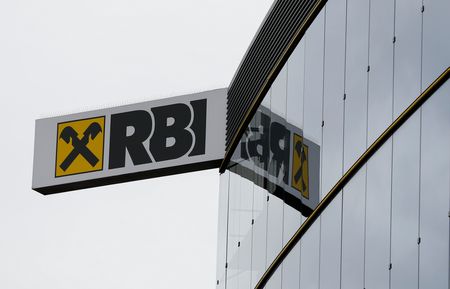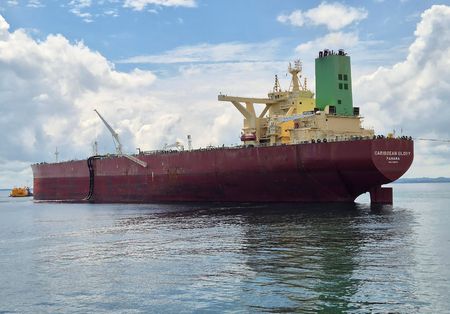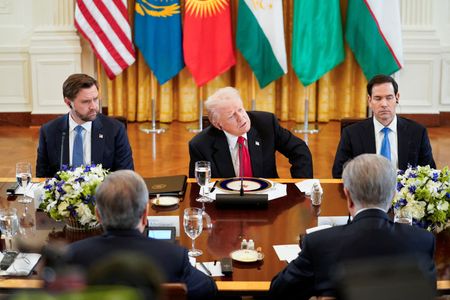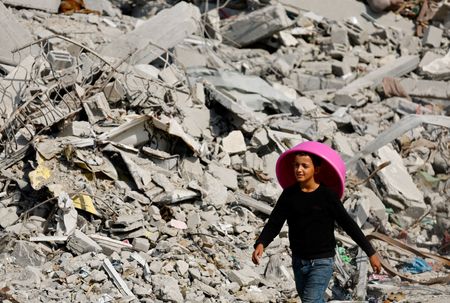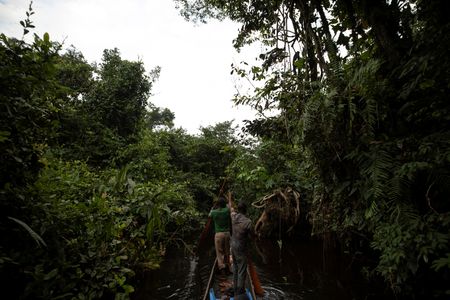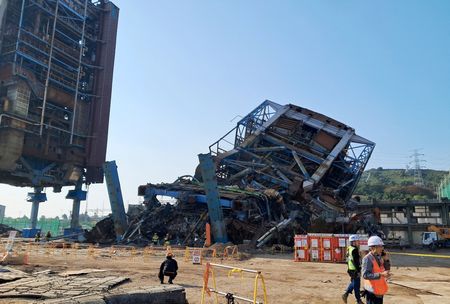By John O’Donnell, Miranda Murray and Francois Murphy
VIENNA (Reuters) -Austria’s Raiffeisen Bank International said it has set aside 840 million euros ($865 million) to cover the costs of a Russian legal penalty, after a recent court ruling that could cost the biggest Western bank in Russia billions.
The provision hit the lender’s financial results for last year, which were also dented by an 824 million euro loss from the sale of its bank in Belarus, with Raiffeisen’s consolidated annual profit dropping by more than 50% to 1.15 billion euros.
The combined effect of almost 1.7 billion euros underscores the risks of Raffeisen’s business with Russia and former Soviet countries that fuelled its growth since the collapse of communism.
Last month, a Russian court awarded more than 2 billion euros ($2.1 billion) of damages against Raiffeisen (RBI) in a landmark ruling.
The case, delivered to a courtroom where armed men in balaclavas sat among those involved in the case in what was seen as an attempt at intimidation, is one of the most significant rulings against a Western company still operating in Russia, with one of the largest awards of damages yet.
Although Raiffeisen was aware of the case last year, it had not announced provisions for the fallout until Tuesday.
Almost three years after Russia’s full-scale invasion of Ukraine, RBI remains active in Russia, stemming from Vienna’s previously long-standing role as a hub for cash from Russia and former Soviet states.
That bond put Raiffeisen and Austria on the front line of a global push by the United States to isolate Russia by reinforcing sanctions on banking and choking off access to Western goods after it invaded Ukraine.
The dispute followed the failure of an earlier deal that Raiffeisen hoped would allow it to unlock some of its frozen billions in Russia.
The case was centred on a claim by Russian investment company Rasperia against builder Strabag, its Austrian shareholders and the Russian arm of Raiffeisen.
RBI had sought to buy a stake in Vienna-based Strabag from Rasperia, which Strabag had linked to Russian tycoon Oleg Deripaska.
Washington identified Rasperia as part of a group of Russian companies still controlled by Deripaska, when it imposed sanctions on some of those involved.
Deripaska has always said he had no links with the company at the heart of the dispute with Raiffeisen.
Raiffeisen has around 6 billion euros ($6.29 billion) in Russia earned from international payments and from billions of euros of Russian deposits, one person with knowledge of the matter has told Reuters.
Raiffeisen, with a myriad of industrial holdings, more than 18 million customers from Vienna to Moscow and 44,000 staff, has become a financial anchor for Austria and much of eastern Europe.
RBI has repeatedly said it wanted to spin off its Russian business, but almost three years into the war between Russia and Ukraine, little has changed.
While many Western governments have shunned Russia, some Austrian politicians have been reluctant to sever ties with a country still thanked for allowing Austria’s rehabilitation in 1955 following World War Two.
($1 = 0.9707 euros)
(Reporting by Miranda Murray and John O’DonnellEditing by Ludwig Burger and Susan Fenton)

